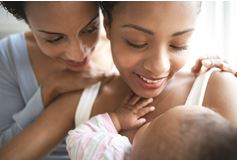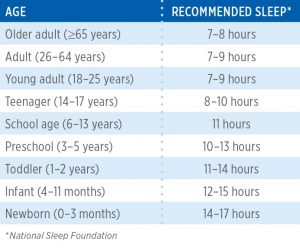Sleep Guidelines Every Parent Should Know
Multiple studies show the importance of sleep for children, whether they are infants or teenagers. A recent study published in the journal Sleep showed that short sleep duration is a risk factor for the development of obesity in infants, children, and adolescents (Miller, Kruisbrink, Wallace, Ji & Cappuccio, 2018).
According to the National Sleep Foundation, here are current recommended sleep guidelines:
For new parents in particular, it is important to stay up to date on the current sleep safety guidelines from the American Academy of Pediatrics (AAP) and Centers for Disease Control and Prevention (CDC). Following safe sleep guidelines is linked with decreased rates of Sudden Infant Death Syndrome (SIDS). To practice safe sleep, here are six recommendations:
- Back to Sleep. Babies should sleep on their backs (not on their stomachs) until their first
- Use a firm Sleep Surface. Babies should sleep in a crib, bassinet, portable crib or play yard that meets safety standards from the Consumer Product Safety Commission. This sleep surface should be covered with a tight-fitting, firm mattress and a fitted sheet. A car seat or a swing are not considered safe sleeping areas.
- Share your room, but not your bed. Put your baby’s bassinet or crib close to your bed for the first year of their life. The baby should not sleep in your bed with you.
- Keep loose bedding and soft objects out of your baby’s sleep area. The only thing that should be in your baby’s crib or bassinet for the first year of their life is your baby! Pillows, blankets, toys, bumper pads and other items increase the risk of suffocation for your baby.
- Breastfeed your baby. Lactation consultants recommend breastfeeding as the sole source of nutrition for the first six months of a baby’s life. Taking a breastfeeding class or meeting with a lactation counselor are great ways to receive guidance on your baby’s nutrition. To make an appointment with a Bon Secours lactation counselor, please call (804) 730-4690 and ask to schedule a lactation counseling appointment with Tiffany Powers.
- Avoid smoking or drinking alcohol while pregnant or after your baby is born. Exposure to second-hand smoke endangers babies and children, and alcohol can make parents drowsy and put a baby at risk.
You can learn more about caring for your baby through Bon Secours Love & Learn prenatal and new parent classes.
The following links are the sources for this article. For additional information and resources, please explore these websites:
American Academy of Pediatrics, 2016 Guidelines:
http://pediatrics.aappublications.org/content/early/2016/10/20/peds.2016-2938/
CDC:
https://www.cdc.gov/vitalsigns/safesleep/index.html
National Sleep Foundation:
https://sleepfoundation.org/excessivesleepiness/content/how-much-sleep-do-babies-and-kids-need
Michelle A. Miller, Marlot Kruisbrink, Joanne Wallace, Chen Ji, Francesco P. Cappuccio; Sleep duration and incidence of obesity in infants, children, and adolescents: a systematic review and meta-analysis of prospective studies, Sleep, Volume 41, Issue 4, 1 April 2018, zsy018, https://doi.org/10.1093/sleep/zsy018


Comments are closed